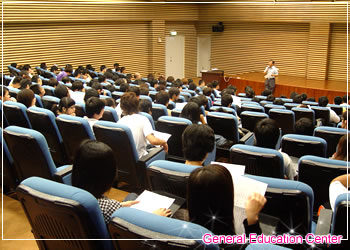E-Mail: cge@wfu.edu.tw
Cht Website:http://adm.wfu.edu.tw/cge/
Eng Website:http://www2.wfu.edu.tw/wp/english/?p=106
The Center for General Education(CGE) is responsible for the strategic of planning general education courses and administering of English graduation threshold assessments. The following sections outline CGE’s core mission, curriculum framework, faculty structure, facilities, and key developmental initiative.
CGE is dedicated to fostering students’ intellectual and physical development. Its objectives include enhancing foundational and practical language skills, promoting knowledge in the humanities, life skills, and civic awareness, and cultivating critical thinking, problem-solving, and innovation.
CGE’s curriculum is divided into two main categories:
- Core Literacy Courses – Includes Chinese, English, Physical Education, and optional National Defense Education and Military Training. Additionally, it features four specialized courses: Labor Education, Safety Education, Professional Ethics, and Introduction to Originality and Intellectual Property Rights.
- Civic Literacy Courses – Covers six fields: humanities, art and aesthetics, business, life sciences, legal studies, and natural sciences.
The general education curriculum requires 22 credits, with 18 credits for core literacy courses and 4 credits for civic literacy courses. While core literacy courses are mandatory, students can choose civic literacy courses based on their interests.
Following the University’s 2020 restructuring, CGE transitioned from a teaching unit to an administrative body under the Office of Academic Affairs. The General Education Committee, chaired by the University President, oversees curriculum planning, faculty recruitment, and policy development. The committee consists of six subfields, each led by a convener appointed by the Vice President of Academic Affairs.
As of February 1, 2024, CGE has been reinstated as an academic unit. The center’s team includes:
- A Director, responsible for coordinating courses and academic activities.
- An Administrative Educator, in charge of English proficiency assessments.
- A Contracted Assistant, supporting both instructional and administrative tasks.
CGE operates 18 e-classrooms, one audio-visual classroom, and two specialized classrooms for fine arts, humanities, and Chinese counseling. These classrooms are equipped with modern computer systems to enhance learning. CGE continuously allocates funding for facility upgrades and seeks additional support from the Ministry of Education to enhance teaching and research resources.
To enrich learning, CGE also invests in scholarly journals, books, and multimedia educational materials.
- Labor Education – Cultivates leadership, equality, and community service awareness.
- Safety Education – Supports physical and mental well-being.
- Professional Ethics – Develops social responsibility and ethical decision-making.
- Introduction to Originality and Intellectual Property Rights – Encourages creative thinking and understanding of intellectual property laws.
- Physical Fitness – Enhances students’ health and vitality.
- National Defense Education and Military Training – Strengthens knowledge in national security.
- General Knowledge Feasts – Fosters intellectual curiosity and scholarly discussions.
- Chinese/English Language Competitions – Encourages language proficiency through competitive learning.
- English Proficiency Test Preparation – Improves foreign language skills for career readiness.
- Programming and AI Courses – Prepares students for digital transformation and industry demands.
- Civic Literacy Revitalization – Equips students to make informed decisions impacting their lives and society.
CGE remains committed to shaping a dynamic, interdisciplinary learning environment that prepares students for future challenges.
- Language and Literature: Studies on classical Chinese poetry and prose, narrative techniques in Chinese novels, development of folk and popular literature, biographical writing in historical texts
- Education and Teaching: Strategies for teaching Chinese as a second language, curriculum design for Chinese language education, application of children’s literature in language learning, effective methods for teaching applied writing
- Culture and History: The influence of historical and cultural contexts on modern Taiwan, integrating life education into language learning
- Arts and Creativity: Aesthetic principles in classical Chinese literature, the literary and artistic contributions of Su Shi, the role of color symbolism in Chinese literature, innovation in cultural and creative industries
- Interdisciplinary Studies: Psychological factors affecting language learning, ethical considerations in literature and education, strategies for managing emotions in academic settings, promoting safety awareness through educational initiatives, the impact of literature on cross-cultural understanding
- English Language Teaching and Learning: Effective vocabulary acquisition strategies, curriculum development for ESP (English for Specific Purposes), optimizing listening and speaking training methods, improving student performance in English proficiency tests, fostering extensive reading habits
- Language and Literature: Themes and trends in English and American literature, identity and cultural expression in Chinese diaspora literature, linguistic approaches to language acquisition and communication
- Applied English: Enhancing communication skills in hospitality and tourism settings, cultural adaptation in English for the service industry


